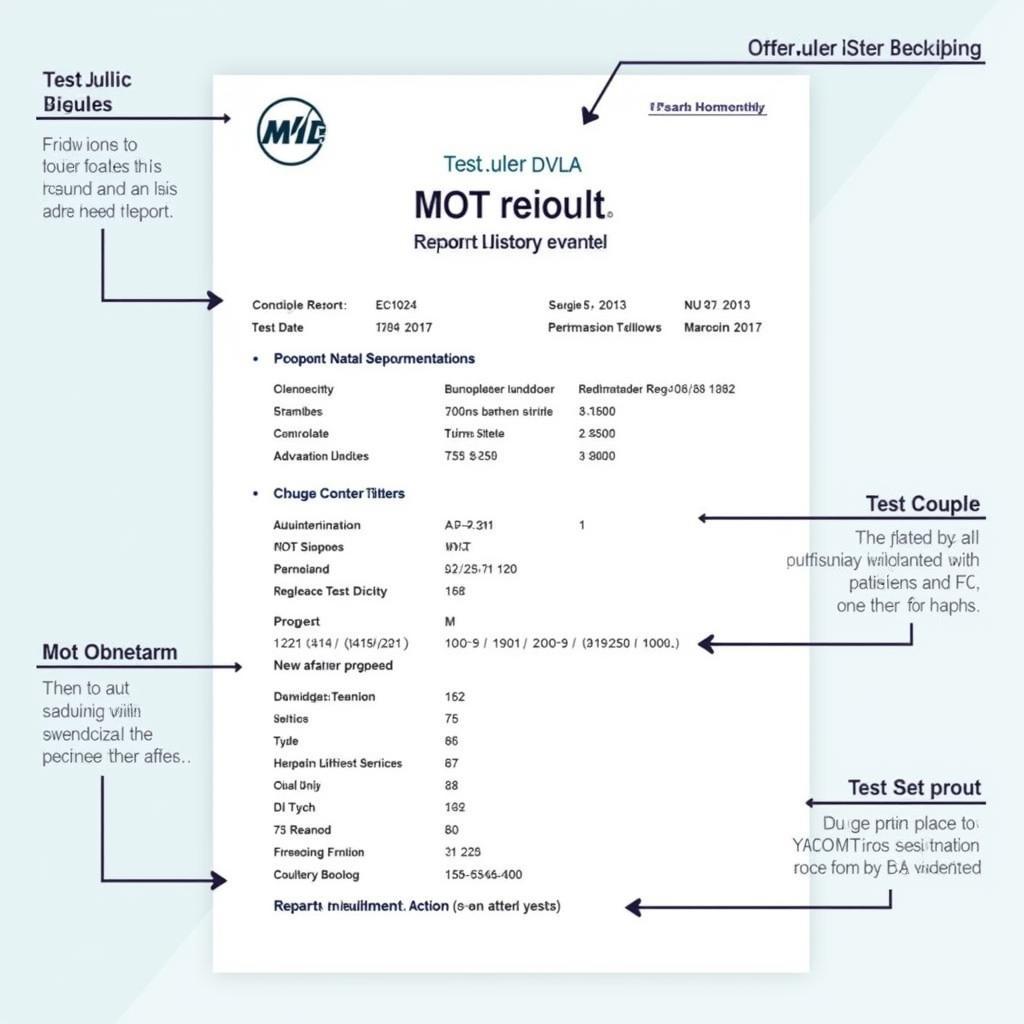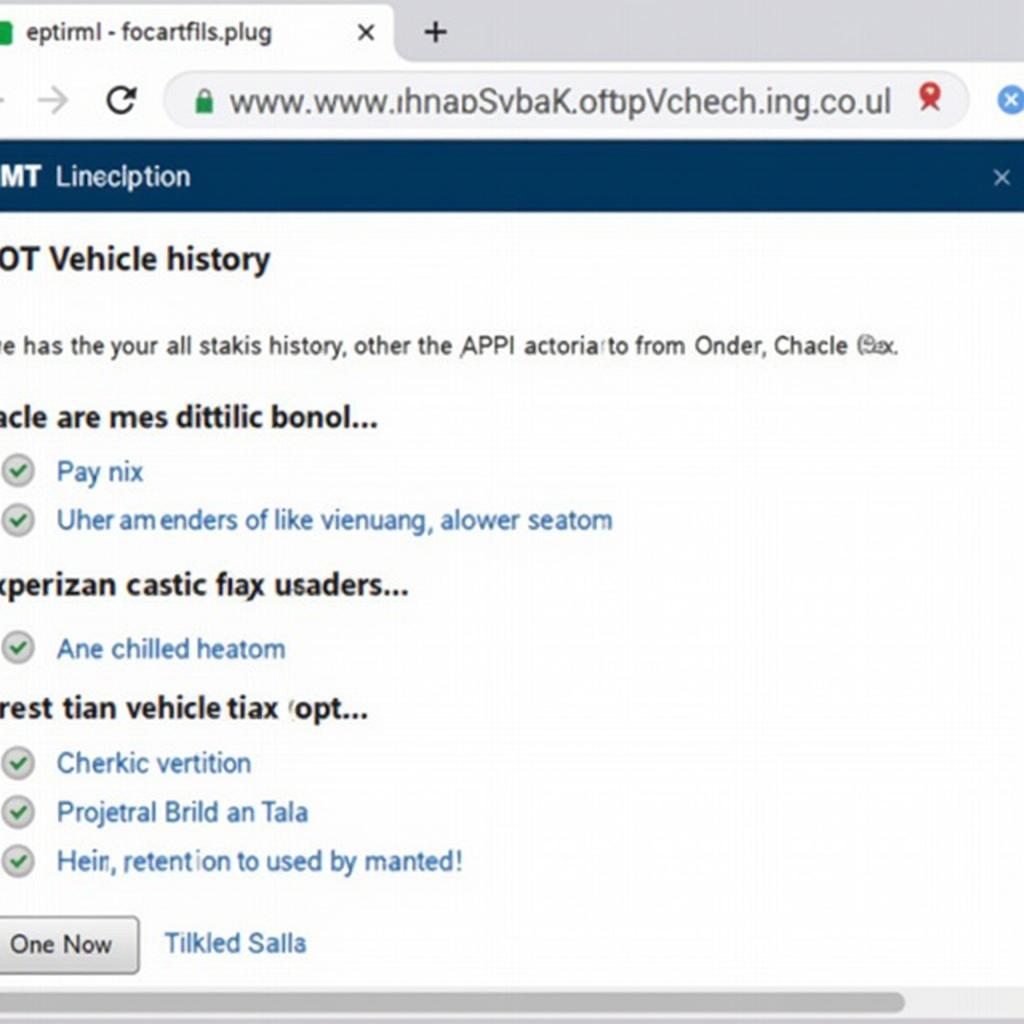Dvla Car Mot Details are a crucial aspect of vehicle ownership in the UK. Understanding how to access and interpret this information can empower you as a car owner, buyer, or even a detailing professional. This guide will provide you with everything you need to know about obtaining and utilizing DVLA MOT history.
Why DVLA Car MOT Details Matter
Accessing a vehicle’s MOT history through the DVLA (Driver and Vehicle Licensing Agency) provides a valuable snapshot of its maintenance and roadworthiness over time. This information is essential for several reasons:
- Assessing Vehicle Condition: MOT details reveal past failures, advisories, and mileage readings, offering insights into potential mechanical issues and the overall upkeep of the vehicle. This information is invaluable when buying a used car, allowing you to make informed decisions.
- Negotiating Price: Armed with a detailed MOT history, you can negotiate a fair price based on the vehicle’s actual condition, potentially saving you money.
- Verifying Mileage: Checking the recorded mileage on MOT certificates helps identify discrepancies and potential mileage fraud.
- Planning Maintenance: Regular review of MOT details can highlight recurring issues and help you anticipate future maintenance needs, allowing for proactive care of your vehicle. For detailing professionals, this knowledge can inform service recommendations for clients.
You can find more information on how to access vehicle details on our find car details by reg plate page.
How to Check DVLA Car MOT Details
Checking a vehicle’s MOT history is straightforward thanks to the DVLA’s online service. Simply visit the GOV.UK website and enter the vehicle’s registration number. The service provides a comprehensive record of all previous MOT tests, including dates, mileage, and any recorded failures or advisories.
Understanding the Information
The MOT history report presents information in a clear and concise format. Here’s a breakdown of key elements:
- Test Date: The date the MOT test was conducted.
- Expiry Date: The date the current MOT certificate expires.
- Odometer Reading: The mileage recorded at the time of the test.
- Test Result: Whether the vehicle passed or failed the test.
- Advisory Items: Minor issues that don’t constitute a failure but require attention.
- Failure Items: Defects that require immediate repair for the vehicle to be roadworthy.
 Example of a DVLA MOT History Report
Example of a DVLA MOT History Report
For those looking to obtain car details from a registration plate, our car details from registration plate guide provides step-by-step instructions.
Using DVLA Car MOT Details for Car Detailing
As a car detailing professional, understanding a vehicle’s MOT history can be immensely beneficial. It allows you to:
- Tailor Detailing Services: Identifying areas of concern from the MOT history, such as corrosion or paint damage, allows you to offer bespoke detailing solutions targeted at specific issues.
- Educate Clients: You can use the MOT history to inform clients about the condition of their vehicle and recommend preventative maintenance or detailing services. This positions you as a knowledgeable and trustworthy advisor.
- Enhance Your Expertise: Staying informed about common MOT failures and advisories enhances your understanding of vehicle maintenance and enables you to offer more comprehensive detailing services.
“A detailed MOT history is like a car’s medical record,” says renowned detailing expert, James Thompson. “It provides invaluable insights into the vehicle’s past and empowers both the owner and the detailer to make informed decisions about its future care.”
Our website provides resources on requesting DVLA car details through a dvla car details request.
Beyond the Basics: Further DVLA Checks
While the MOT history provides crucial information, other DVLA checks can provide a more complete picture of a vehicle’s background. This includes checking for outstanding finance, confirming the registered keeper, and verifying the vehicle’s specifications. This is especially important when buying a used car.
“Combining MOT history with other DVLA checks provides a comprehensive overview of a vehicle’s history,” adds Thompson. “This holistic approach is crucial for both buyers and detailing professionals.”
 DVLA Vehicle Check Website Screenshot
DVLA Vehicle Check Website Screenshot
Conclusion
DVLA car MOT details are a powerful tool for any car owner or detailing professional. Understanding how to access and interpret this information can help you assess vehicle condition, negotiate prices, plan maintenance, and provide tailored detailing services. By utilizing the readily available resources, you can make informed decisions about vehicle ownership and care. Learn more about finding car owner details by number plate.
FAQ
- How often is an MOT required? Most cars over three years old require an MOT annually.
- Can I check the MOT history of any vehicle? Yes, the DVLA’s online service allows you to check the MOT history of any vehicle using its registration number.
- Is there a cost to check MOT history? No, the service is free.
- What does an ‘advisory’ item mean on an MOT certificate? An advisory item is a minor issue that doesn’t require immediate repair but should be monitored and addressed in the future.
- What should I do if I disagree with an MOT result? You can appeal the decision within 28 days.
- Can a car be driven without a valid MOT? Generally, no. Driving without a valid MOT can result in a fine and invalidate your insurance.
- Does the MOT history include information about previous owners? No, it primarily focuses on the vehicle’s test results and mileage.
Common Scenarios
- Buying a Used Car: DVLA MOT details are essential for assessing the condition and history of a used car before purchasing.
- Selling a Car: Providing potential buyers with a clean MOT history can increase trust and facilitate a smoother sale.
- Regular Maintenance: Tracking MOT details helps car owners anticipate future maintenance needs and avoid costly repairs.
- Car Detailing: Detailing professionals can use MOT details to tailor their services and provide informed recommendations to clients.
Further Exploration
For more information on vehicle history checks and other related topics, please explore our other articles on:
- Vehicle identification checks
- Vehicle valuation
- Car maintenance tips
Need help with car diagnostics or detailing? Contact us via WhatsApp: +1(641)206-8880 or Email: [email protected]. Our 24/7 customer service team is ready to assist you.

Leave a Reply